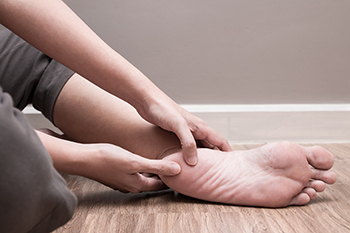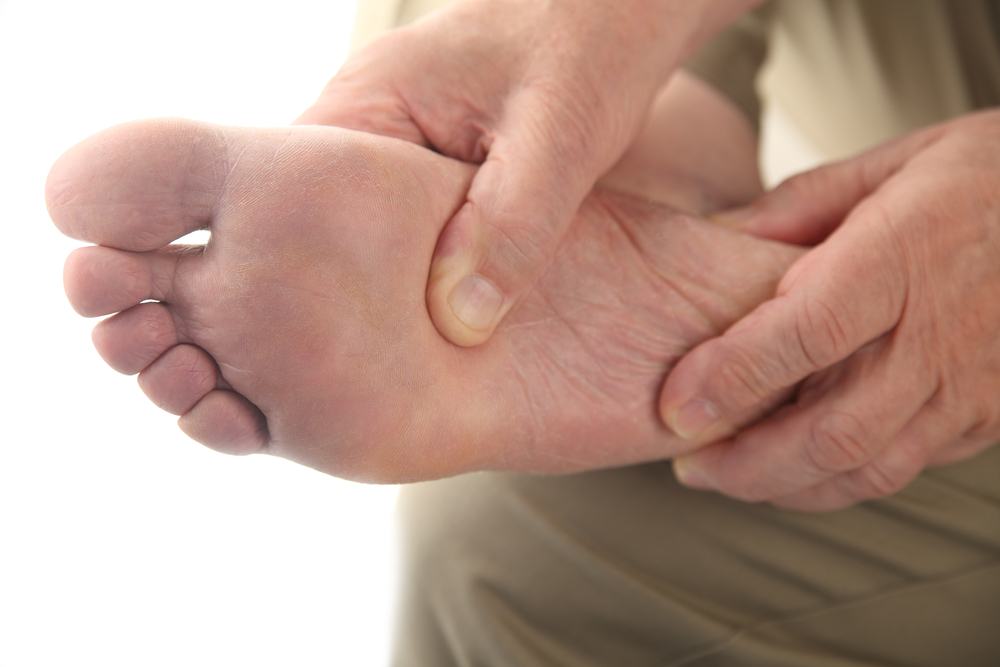Connect With Us
Items filtered by date: September 2021
Understanding Heel Bursitis
 Heel pain is one of the most common reasons people visit a podiatrist, and it can make daily activities like work and exercise almost impossible. One source of heel pain is heel bursitis. This can occur when either the bursa sac of fluid that attaches the Achilles tendon and the calcaneal tendon becomes inflamed (known as retrocalcaneal bursitis), or the padding under the heel begins to degenerate because of trauma (known as subcutaneous calcaneal bursitis). Heel pain can have a variety of causes and can affect anyone. If you are struggling with heel pain, consulting with a podiatrist can be extremely beneficial. A podiatrist will be able to properly diagnose and treat the source of the pain.
Heel pain is one of the most common reasons people visit a podiatrist, and it can make daily activities like work and exercise almost impossible. One source of heel pain is heel bursitis. This can occur when either the bursa sac of fluid that attaches the Achilles tendon and the calcaneal tendon becomes inflamed (known as retrocalcaneal bursitis), or the padding under the heel begins to degenerate because of trauma (known as subcutaneous calcaneal bursitis). Heel pain can have a variety of causes and can affect anyone. If you are struggling with heel pain, consulting with a podiatrist can be extremely beneficial. A podiatrist will be able to properly diagnose and treat the source of the pain.
Many people suffer from bouts of heel pain. For more information, contact one of our podiatrists of The Podiatry Center, PC. Our doctors can provide the care you need to keep you pain-free and on your feet.
Causes of Heel Pain
Heel pain is often associated with plantar fasciitis. The plantar fascia is a band of tissues that extends along the bottom of the foot. A rip or tear in this ligament can cause inflammation of the tissue.
Achilles tendonitis is another cause of heel pain. Inflammation of the Achilles tendon will cause pain from fractures and muscle tearing. Lack of flexibility is also another symptom.
Heel spurs are another cause of pain. When the tissues of the plantar fascia undergo a great deal of stress, it can lead to ligament separation from the heel bone, causing heel spurs.
Why Might Heel Pain Occur?
- Wearing ill-fitting shoes
- Wearing non-supportive shoes
- Weight change
- Excessive running
Treatments
Heel pain should be treated as soon as possible for immediate results. Keeping your feet in a stress-free environment will help. If you suffer from Achilles tendonitis or plantar fasciitis, applying ice will reduce the swelling. Stretching before an exercise like running will help the muscles. Using all these tips will help make heel pain a condition of the past.
If you have any questions please contact our office located in Millburn, NJ . We offer the newest diagnostic and treatment technologies for all your foot and ankle needs.
Heel Pain Can Be Treated!
Keeping a Watchful Eye on the Diabetic’s Feet
Complications from diabetes can have profound effects on foot and ankle health. Heightened glucose levels can lead to nerve damage (neuropathy) and blockages in the blood vessels (peripheral vascular disease). Both of these obstacles can increase a diabetic’s risk for developing, detecting, and healing foot ulcers. Non-healing diabetic ulcers can become infected and lead to far more serious complications such as gangrene or even amputation in the most severe cases. These high-risk scenarios make it imperative for diabetics to check their feet daily for any cuts or abrasions and be under the care of a podiatrist who can help them manage any stumbling blocks that may arise.
Diabetic foot care is important in preventing foot ailments such as ulcers. If you are suffering from diabetes or have any other concerns about your feet, contact one of our podiatrists from The Podiatry Center, PC. Our doctors can provide the care you need to keep you pain-free and on your feet.
Diabetic Foot Care
Diabetes affects millions of people every year. The condition can damage blood vessels in many parts of the body, especially the feet. Because of this, taking care of your feet is essential if you have diabetes, and having a podiatrist help monitor your foot health is highly recommended.
The Importance of Caring for Your Feet
- Routinely inspect your feet for bruises or sores.
- Wear socks that fit your feet comfortably.
- Wear comfortable shoes that provide adequate support.
Patients with diabetes should have their doctor monitor their blood levels, as blood sugar levels play such a huge role in diabetic care. Monitoring these levels on a regular basis is highly advised.
It is always best to inform your healthcare professional of any concerns you may have regarding your feet, especially for diabetic patients. Early treatment and routine foot examinations are keys to maintaining proper health, especially because severe complications can arise if proper treatment is not applied.
If you have any questions please feel free to contact our office located in Millburn, NJ . We offer the newest diagnostic and treatment technologies for all your foot and ankle needs.
Read more about Diabetic Foot ConditionsRisk Factors for Gout
Gout is a type of arthritis that is caused by excess uric acid in the bloodstream crystallizing and lodging in the joints. It frequently affects the joints of the big toes, which causes sudden and intense pain, swelling, redness, warmth, and stiffness. Certain people are more at risk of developing gout than others. People who have medical conditions such as diabetes, kidney disease, high blood pressure, high cholesterol, and osteoarthritis should be vigilant of any gout symptoms. Gout is also associated with obesity and with diets high in purines, which are found in seafood and red meat. Certain medications can increase uric acid levels in the body, which may lead to gout. Men are more likely to develop gout prior to the age of 60, while both men and women aged 60 and over have an equal risk of developing gout. Finally, gout may be more likely in people with a family history of this condition. If you have gout or are at risk for it, please consult with a podiatrist, who can help you get the right treatments and teach you strategies to prevent gout.
Gout is a foot condition that requires certain treatment and care. If you are seeking treatment, contact one of our podiatrists from The Podiatry Center, PC. Our doctors will treat your foot and ankle needs.
What Is Gout?
Gout is a type of arthritis caused by a buildup of uric acid in the bloodstream. It often develops in the foot, especially the big toe area, although it can manifest in other parts of the body as well. Gout can make walking and standing very painful and is especially common in diabetics and the obese.
People typically get gout because of a poor diet. Genetic predisposition is also a factor. The children of parents who have had gout frequently have a chance of developing it themselves.
Gout can easily be identified by redness and inflammation of the big toe and the surrounding areas of the foot. Other symptoms include extreme fatigue, joint pain, and running high fevers. Sometimes corticosteroid drugs can be prescribed to treat gout, but the best way to combat this disease is to get more exercise and eat a better diet.
If you have any questions please feel free to contact our office located in Millburn, NJ . We offer the newest diagnostic and treatment technologies for all your foot and ankle needs.
Plantar Warts Can Be Treated!
Help Your Child Step Into a Lifetime of Healthy Nails
Ingrown toenails can occur when toenails are too short and/or when footwear is too tight. Because children are still learning proper foot hygiene and their feet are growing so rapidly, they are quite susceptible to ingrown toenails. You can help them avoid this painful condition with a little guidance and supervision. Show them how to properly trim their toenails so that they can begin taking care of their own. After a shower or bath when their nails are softer, demonstrate how to properly trim toenails: straight across, and not rounded or too short. The corners of toenails should still be visible after trimming. Explain how these techniques allow nails to grow on top of the skin at the edges, rather than into it. Also, be sure to check frequently to make sure their shoes fit properly—both in length and width. Encourage them to get involved in their own foot health by being aware of when their shoes start feeling tight, and helping look for shoe styles with wider toe boxes when shoe shopping. If your child does develop an ingrown toenail, make an appointment with a podiatrist for proper treatment and to avoid an infection from possibly setting in.
Ingrown toenails may initially present themselves as a minor discomfort, but they may progress into an infection in the skin without proper treatment. For more information about ingrown toenails, contact one of our podiatrists of The Podiatry Center, PC. Our doctors can provide the care you need to keep you pain-free and on your feet.
Ingrown Toenails
Ingrown toenails are caused when the corner or side of a toenail grows into the soft flesh surrounding it. They often result in redness, swelling, pain, and in some cases, infection. This condition typically affects the big toe and may recur if it is not treated properly.
Causes
- Improper toenail trimming
- Genetics
- Improper shoe fitting
- Injury from pedicures or nail picking
- Abnormal gait
- Poor hygiene
You are more likely to develop an ingrown toenail if you are obese, have diabetes, arthritis, or have any fungal infection in your nails. Additionally, people who have foot or toe deformities are at a higher risk of developing an ingrown toenail.
Symptoms
Some symptoms of ingrown toenails are redness, swelling, and pain. In rare cases, there may be a yellowish drainage coming from the nail.
Treatment
Ignoring an ingrown toenail can have serious complications. Infections of the nail border can progress to a deeper soft-tissue infection, which can then turn into a bone infection. You should always speak with your podiatrist if you suspect you have an ingrown toenail, especially if you have diabetes or poor circulation.
If you have any questions, please feel free to contact our office located in Millburn, NJ . We offer the newest diagnostic and treatment technologies for all your foot care needs.
Read more about Ingrown Toenail CareBlog Archives
- April 2025
- March 2025
- February 2025
- January 2025
- December 2024
- November 2024
- October 2024
- September 2024
- August 2024
- July 2024
- June 2024
- May 2024
- April 2024
- March 2024
- February 2024
- January 2024
- December 2023
- November 2023
- October 2023
- September 2023
- August 2023
- July 2023
- June 2023
- May 2023
- April 2023
- March 2023
- February 2023
- January 2023
- December 2022
- November 2022
- October 2022
- September 2022
- August 2022
- July 2022
- June 2022
- May 2022
- April 2022
- March 2022
- February 2022
- January 2022
- December 2021
- November 2021
- October 2021
- September 2021
- August 2021
- July 2021
- June 2021
- May 2021
- April 2021
- March 2021
- February 2021
- January 2021
- December 2020
- November 2020
- October 2020
- September 2020
- August 2020
- July 2020
- June 2020
- May 2020
- April 2020
- March 2020
- February 2020
- January 2020
- December 2019
- November 2019
- October 2019
- September 2019
- August 2019
- July 2019
- June 2019
- May 2019
- April 2019
- March 2019
- February 2019
- January 2019
- December 2018
- November 2018
- October 2018
- September 2018
- August 2018
- July 2018
- June 2018
- May 2018
- April 2018
- March 2018
- February 2018
- January 2018
- December 2017
- November 2017
- October 2017
- September 2017
- August 2017
- July 2017
- June 2017
- May 2017
- April 2017
- March 2017
- February 2017
- January 2017
- December 2016
- November 2016
- October 2016
- September 2016
- August 2016
- July 2016
- June 2016
- May 2016
- April 2016
- March 2016
- February 2016
- January 2016
- December 2015
- November 2015
- October 2015
- September 2015
- August 2015
- July 2015
- June 2015
- May 2015
- January 2014
- December 2013
- November 2013
- October 2013
- September 2013
- August 2013
- July 2013
- June 2013
- May 2013
- April 2013
- March 2013
- February 2013
- January 2013
- December 2012
- November 2012
- October 2012
- September 2012
- August 2012
- July 2012
- June 2012





